Introduction
Say it ain’t so, I will not go/
Turn the lights off, carry me home/
(Blink 182, “All The Small Things,” 1999)
I should probably start this essay by stating I am a huge fan of pop punk music, it is my favorite type of music and all my favorite bands – The Wonder Years, Fireworks and Yellowcard to name a few – fall under the pop punk banner. Which is the reason I wanted to explore whether first of all pop punk is either male or female orientated in its appeal, because I’ve heard pop punk groups, such as Blink 182 and All Time Low referred to as ‘guilty pleasures’ by friends, and secondly, perhaps more importantly, whether pop punk music can be taken seriously as a genre of music and have any serious artistic value.
‘Get Your Heart On!’ is the title of Simple Plan’s fourth studio album, released in 2011, and in case you didn’t catch it the cheeky title is a boner joke, just like Blink 182’s 2001 album Take Off Your Pants and Jacket, highlights one of the main conflicts surrounding pop punk, is it far too silly and childish to be taken seriously as a credible genre of music? Does the focus on masturbation, skateboarding, cracking jokes and drinking often associated with the genre mean it hasn’t produced any significant albums?
I am particularly interested in comparing and examining the change in pop punk music’s gender appeal and artistic value between its peak in the early 2000s, post-Enema of State, and the revival experienced at the end of the decade, post 2010 and the Pop Punks Not Dead Tour, following its steep decline in popularity during the mid-00s. While I personally believe that pop punk music appeals more to guys on the whole and that it is in fact a serious and important genre of music, The Wonder Years 2013 album The Greatest Generation holds a 96 on Metacritic, it is in the top 20 all-time high scores for albums, I intend to discuss the images, lyrics, sound, and music videos of pop punk bands from throughout the 2000s in order to come to an overall conclusion.
A Brief History of Pop Punk
Sit around and watch the tube/
But nothings on/
(Green Day, “Longview,” 1994)
Before I go any further it is probably best to define exactly what pop punk music is, well according to urban dictionary it is “punk music with pop hooks,” (Urban Dictionary) meaning that it combines the fast tempo music of punk rock with pop-influenced melodies and lyrical themes, focusing on girls, being young and partying as opposed to the traditional anti-establishment themes of punk music. Pop punk’s roots can be traced back to 1970s with The Ramones, whose mix of pop-style tunes and punk rock speed, as seen in their 1976 song “Blitzkreig Bop,” is essentially the blueprint for modern day pop punk. However it wasn’t until the late 80s/ early 90s that pop punk began to emerge as a serious sub-genre of punk music, in particular with the commercial success of Green Day’s third album Dookie and The Offspring’s fourth album Smash both released in 1994, to this date Dookie has sold more than 20 million albums worldwide. With Green Day’s debut single “Longview,” which is all about being bored, typifying the lyrical themes of pop punk.
Around the turn of the 21st Century was when pop punk music truly burst into the mainstream in what is known as “the second wave,” starting with the release of Blink 182’s Enema of the State in 1999. The album’s radio friendly and glossy polished sound, greatly influenced pop punk music, with the album’s commercial success, significant air-play for singles such as “What’s My Age Again?” and the playful, goofy and juvenile tone of the lyrics “We started making out, she took off my pants, but then I turned on the TV” and wacky music videos, featuring the band running around the streets completely naked in “What’s My Age Again?”, greatly impacting pop punk, influencing the main wave of pop punk bands that would soon follow.
The early 2000s saw the peak of pop punk music, with Yellowcard, New Found Glory, Sum 41, Good Charlotte, Busted (in the UK) and Avril Lavigne, along with plenty of other bands, all achieving commercial success. Much like how Grunge was the dominant genre of rock music during the 1990s, pop punk was undeniably the prevalent rock genre during the early 2000s, as can be seen with the huge influx of new pop punk bands. The massive mainstream popularity of groups such as Blink 182 saw them appealing to groups not usually associated with punk, such as young girls, which is perhaps why some pop punk groups have a negative stigma surrounding them, as though they were manufactured simply for the purpose of commercial success.
However the commercial success began to fade away as the 00s progressed, and while Green Day were still headlining arena tours and sold out shows, others such as Yellowcard have seen a steady decline in attendance and pop punk music began to evolve. Moving beyond traditional three chord structures and polished sound of early 00s and began incorporating elements of more hardcore music, including breakdowns and rawer production values, especially seen in the music of A Day to Remember. As well as moving away from the playful lyrics of Blink 182 towards more realistic and honest lyrics focusing more on fears, failures and personal experiences, for example The Wonder Years “Passing Through a Screen Door” which faces up to failure “While my cousins go to bed with their wives, I’m feeling like I’ve fallen behind.”
‘McBusted’ and Guilty Pleasures
“He said I’ve been to the year 3000/
Not much has changed but they live underwater/
(Busted, “Year 3000,” 2002)
While talking to one of my friends back in England on Skype over the weekend we got around to the debut of new pop punk super group McBusted which saw two of the biggest bands from our childhood, McFly and Busted, joining together and performing on the Children in Need fundraiser. Although I was eager to express my excitement and joy at seeing my favorite childhood bands performing on stage at the same time I found myself using the phrase “not to sound gay” to preface my statement in an attempt to avoid the negative stigma attached to both groups as well as many other pop punk groups.
Both me and my friend repeatedly referred to the bands as guilty pleasures, almost as if we as guys should not be listening to them, as if it was wrong for us to be doing so, perhaps this is because of the screaming girl associated with them, because the word pop is in the title of the genre, or because we listen to when we were young they have a sense of childishness around the music. When mentioning McBusted to one of my friends here in America he noted how he felt the same with Blink 182, it was music “he wasn’t supposed to be listening too.”
I believe that McBusted and Blink 182 feel like ‘guilty pleasures’ because of the polished sound and image of the bands seem more feminine. In the sense it feels produced to appeal to the largest market possible, they look clean cut and stylish in a similar way to boy bands, combined with the catchy poppy lyrics and sonically polished albums and singles, making them appear to be aimed towards a more pre-teen/ teenage girl audience, making it feel wrong to listen to the music because of the intended audience.
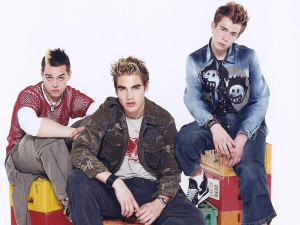
- A picture of the band Busted from fanpop – http://www.fanpop.com/clubs/busted/images/5436526/title/busted-photo
This is a picture of Busted, and it’s easy to imagine a poster like this being on the bedroom wall of any teenage girl. Although I enjoy the music because its catchy and easy to listen to, the image of the band suggests they aren’t be market towards my demographic, and therefore I shouldn’t really be listening to the band, thus resulting in this ‘guilty pleasure’ feeling.
Since U Been Gone
“Since u been gone/
I can breathe for the first time/”
(Kelly Clarkson, “Since U Been Gone,” 2004)
In 2008 pop punk band A Day To Remember released a cover of Kelly Clarkson’s hit song “Since U Been Gone,” which on first glance may seem to again reinforce the female appeal of pop punk with the band trying to find commercial success by attempting to appeal to fans of the female dominated pop music. However upon listening to the song and its use of screamed vocals and breakdowns, it becomes clear that its target audience is definitely the angst filled teenage guy, which probably explains why it was one of my favorite songs of 2008. The music video, featuring the band participating in the ultimate rock cliché, smashing shit up, highlights again how by this time, after pop punk’s decline, it seems to be appealing on the whole more dominantly to a male audience, no longer pandering to a broad spectrum, it has accepted its target audience and is aiming itself right at them, that is of course not to say that pop punk music doesn’t appeal to women, just is more aimed at guys. In describing why the band decided to cover “Since U Been Gone” lead singer Jeremy McKinnon stated “we thought it would embody what we are as a band by taking like, the poppiest thing ever and still making it hard enough to where kids still fight at our shows over it” referring to the culture of mosh-pitting at concerts, an extremely male dominated activity.
Image
“I’m not a self-help book/
I’m just a fucked up kid/”
(The Wonder Years, “Local Man Ruins Everything,” 2011)
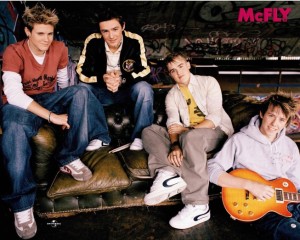
Picture of the band McFly from sing 365 -http://www.sing365.com/music/lyric.nsf/McFly-Biography/82151CE8B98CFEB948256E84000F6A43
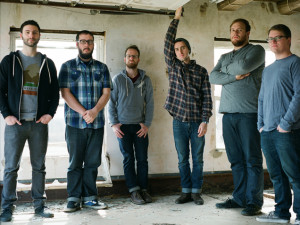
Picture of The Wonder Years from Hopeless Records – http://hopelessrecords.com/artists/the-wonder-years/
Here we have two pictures of McFly on the left and The Wonder Years on the right, both are pop punk bands with the image of McFly conforming to the manufactured, heavily produced and styled image of early 2000s pop punk, you can tell that plenty of effort was put into the picture, making sure to capture the band in their best angles to highlight their good looks, which suggested it was more aimed towards teenage girls. However the photo of The Wonder Years, which looks as if they picked 6 ordinary guys up off the street, definitely doesn’t seem to be aimed at attracting the female market, in fact unlike the McFly picture it looks as if it was just thrown together as quickly as possible, with the band just standing around casually, as opposed to McFly much more posed positions, suggesting that for The Wonder Years the music is more important than their image, in comparison to McFly and other early 2000s pop punk bands for whom the image is equally as important as the music. I believe that because the pop punk bands from 2010 and beyond such as The Wonder Years no longer place emphasis on image, it shows that the genre is fully aimed at a male audience, or at least predominantly male audience, since I’d say that guys don’t care for how a band looks, just how the music sounds, or at least I do. This evolution away from the importance of image with pop punk bands can be seen in album covers as well, take a look at a few comparisons here.

Cover for McFly’s album Room on the 3rd Floor from Wikipedia http://upload.wikimedia.org/wikipedia/en/f/f8/Room_on_the_3rd_Floor_%28McFly_album_-_cover_art%29.jpg
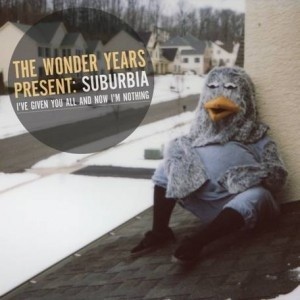
Cover for The Wonder Years Album “Suburbia, I’ve Given You All, and Now I’m Nothing” from Wikipedia http://upload.wikimedia.org/wikipedia/en/e/e1/Suburbia_I%27ve_Given_You_All_and_Now_I%27m_Nothing.jp
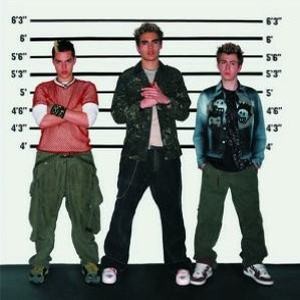
Cover for the self-titled album by Busted from Wikipedia http://upload.wikimedia.org/wikipedia/en/5/58/Bustedcover.jpg
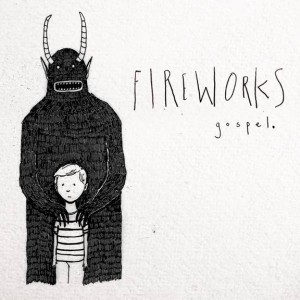
Cover for Fireworks album Gospel from Absolute Punk http://www.absolutepunk.net/showthread.php?t=2270641
I hope you noticed how the early 2000s pop punk bands McFly and Busted place themselves at the forefront of the album covers, perhaps trying to catch the eyes of teenage girls, while The Wonder Years and Fireworks, both from the post-2010 school of pop punk, aren’t anywhere to be found on the covers, and this perhaps shows why pop punk music is experiencing more critical acclaim now than it used to, because without the negative stigma attached to the manufactured images of groups such as Busted, the music is all that’s left to discus.
Sound
“It’s been a lonely year/”
(Real Friends, “I’ve Given Up On You,” 2013)
With bands such as A Day to Remember, The Wonder Years and Real Friends, the pop punk sound has evolved beyond the simple three chord structure employed by Blink 182, becoming ‘heavier,’ in the sense it has taken on a more raw sound, as opposed to the super polished music Blink were producing, and become more musically complex, employing layers of instruments as opposed to simply a guitar, a bass and drums, with The Wonder Years having three guitarists, allowing them to create a denser and more musically advanced sound. Combining huge sing along choruses with gang vocals which further encourage audience participation, killer hooks, distorted guitars, jam along riffs, and advanced musicianship to create a richer, more densely packed sound.
I remember reading an article about Steve Evetts, the producer of The Wonder Years 2013 album The Greatest Generation, and how he would make the band play the songs over and over while recording them until they hit the notes perfectly, especially singer Dan ‘Soupy’ Campbell, not allowing any auto tune or effects to be used, so that the songs would sound natural, compared to the over produced sound of Blink 182 and Busted.
While pop punk is just as catchy as it has ever been it is starting to become more experimental in its execution, showing that pop punk can have artistic value, for example the song “I’ve Given Up On You” by Real Friends, a stripped back song which only uses a complex electric guitar riff and vocals, creating a unique, almost acoustic song.
Perhaps the best example of how pop punk sound has progressed is the closing song on The Wonder Years latest album The Greatest Generation, “I Just Want To Sell Out My Funeral.” A seven minute epic in which the band revisits the all the songs from the album and manages to combine them together into one reflective piece, creating an extremely experimental and daring track, that in my eyes confirms that pop punk does have artistic value and is an important and serious genre of music.
Lyrics
“Depression grab his throat/
And choked the life out of him slowly/
I’ve got the same blood coursing through my veins/
And it’ll come for me eventually/”
(The Wonder Years, “The Devil in My Bloodstream,” 2013)
“Soupy welcomes listeners into the depths of his mind with deeply personal tracks” (Jones) Melissa Jones writes in her review of The Wonder Years 2013 album The Greatest Generation, highlighting perhaps the most important development in pop punk music, the evolution of the heart-wrenchingly honest lyrics, of which Wonder Years singer and lyricist Dan ‘Soupy’ Campbell is the king. It is this move away from the juvenile lyrics of bands like Blink 182 and Busted, such as this line “we laugh when old people fall,” taken from Sum 41’s “Fat Lip” that has allowed pop punk music to be viewed as having artistic value, because the introspective and reflective nature of lyrics from songs such as “A Raindance in Traffic” by The Wonder Years, “the fighter in me must have died a long time again, I must have been watching his ghost” gives weight and purpose to the music, the singers are using music as an evolution of poetry, as a way of expressing their emotions, feelings and experiences, not simply looking to make money. These aren’t songs about college and partying, they are hundreds of stories about the lives of the musicians behind the songs.
The vulnerability of the lyrics in pop punk songs by groups such as The Wonder Years and Real Friends, which can be seen in their respective songs “I Was Scared and I’m Sorry” and “I’ve Given Up On You” with lyrics like“I finally broke on Christmas Eve, in an Outback Steakhouse bathroom while my family ordered for me” and “I write songs about you all the time, I bet I don’t run through your mind” for example, makes the music feel personal in a way no other genre does, in my opinion at least. Combine the vulnerability with the real world grounding of the lyrics, especially in The Wonder Years songs which frequently refer to the bands friends, family and hometown of Lansdale, PA, in particular during the song “Suburbia,” “the most famous person to come out of here was the guy that played Leatherface in all of those chainsaw massacres,” giving pop punk the artistic value of being the most honest and personal music genre, one that allows musicians to express their emotions in the rawest most open way.
Music Videos
“This is not my swan song or adieu so beware/
When they fly my white flag in the air/”
(Fireworks, “Arrows,” 2011)
It could be argued that Blink 182’s music video for the song “What’s My Age Again” is an artistic video because it challenges conceptions around nudity, by having the band run around completely naked in the video, with just their junk being blurred out, and while the video was certainly shocking and revolutionary for the time, the silliness with which it presents nudity, as opposed to how they could have used the video to challenge accepted notions surrounding the human body, meaning that while it does have some artistic value it is cancelled out by the juvenile way in which it is presented, which is the problem with early pop punk music on the whole.
However I’d say the music video for Fireworks 2011 song Arrows is a much better example of a pop punk video with artistic value, since it tells the rather peculiar tale of a group of piñata people being hunted down one by one by a human, using a crossbow. To say that it is an obscure and abstract video is an understatement, but it challenges the notions of what a music video should be about, by having nothing to do with the lyrics of the song, since there is no mention of piñata people in the song, and instead deciding to take the opportunity to push the boundaries of music video, acting like a mini-movie, to tell a riveting tale, that can be interpreted by the consumer as they see fit.
Conclusion
“Elevated by your greatest mistake/
Now I’m all alone/”
(State Champs, “Elevated,” 2013)
I hope that this essay has shown you that modern pop punk is in fact a music genre that has serious artistic value, especially with its honest and personal lyrics, which has broken the juvenile, hyper-produced image of the early 2000s, that led to it being seen as a ‘guilty pleasure’ and has evolved beyond appealing to pre-teen/ teenage girls to be a more male dominated genre.
Works Cited
- -. “Pop Punk.” n.d. Urban Dictionary. November 20th 2013. <http://www.urbandictionary.com/define.php?term=pop-punk>
- Jones, Melissa. “Album Review: The Wonder Years – The Greatest Generation.” May 2013. Alter the Press. December 2nd 2013. <http://www.alterthepress.com/2013/05/atp-album-review-wonder-years-greatest.html>
